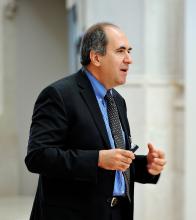In its latest “World Economic Outlook” (WEO, April 2016), the International Monetary Fund (IMF) devotes a chapter to the exploration of the consequences of structural reforms (of product and labor markets) and their interaction with monetary and fiscal policy. The recommendations made in the report refer to and build significantly upon recent research conducted by Paul F. Glaser Professor of Economics Fabio Ghironi with collaborators Matteo Cacciatore, Romain Duval, and Giuseppe Fiori.
The chapter, “Time for a Supply-Side Boost? Macroeconomic effects of Labor and Product Market Reforms in Advanced Economies”, has received significant press coverage as a result of both its advance release in early April and at the time of the full WEO issue launch. Media outlets covering the WEO release and subsequent conversations prompted by its conclusions include the Financial Times, Reuters, The Economist and The Guardian.
The research presented in the WEO found that structural reforms, while beneficial in the medium and long run, can be costly in the short term—especially in the case of labor market reforms. Additionally, the existing economic and policy context plays a key role in the short-run effects of reforms: Certain reforms are more costly than others if implemented during recessions or at times of limited access to international capital markets. Short-run costs are reduced (and longer-term beneficial effects brought closer to the present) if reforms are combined with fiscal stimulus and monetary accommodation.
IMF Managing Director Christine Lagarde, in a press conference for the IMF/World Bank spring meetings this week, called for a “three-pronged policy approach” of monetary, fiscal, and structural actions to address the sluggish growth of the global economy. Her remarks reiterated the points made in the WEO and again built upon the results of work by Ghironi with Cacciatore, Duval and Fiori. Indeed, Lagarde has made various references to the implications of this research in several recent high-profile speeches.
A specialist in international macroeconomics and monetary economics, Professor Ghironi joined UW as Castor Professor of Economics in September 2013. He also holds positions as Director of the International Trade and Macroeconomics (ITM) Research Program at the Central Bank Research Association (CEBRA), an institution connecting researchers at central banks and international institutions; as Research Associate in the International Finance and Macroeconomics Program at NBER, as Research Fellow in the International Macroeconomics and Finance Programme at CEPR, and as a Fellow in the Euro Area Business Cycle Network. He is the U.S. Associate Editor of International Finance, a Co-Editor of εconomics, an Associate Editor of the Journal of International Economics, and an Editorial Board Member of the Review of International Economics. He earned his PhD in economics from the University of California, Berkeley, in 1999.
